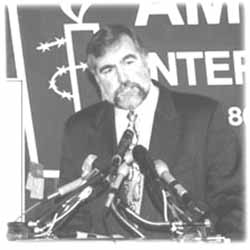|
News
|
|
|
Perspectives
|
|
|
Arts
|
|
|
Sports
|
|
|
Other
|
|

Schulz Speaks Poignantly of Human Rights
by James Blachly

|
|
Moving orator: Amnesty International Director William Schulz spoke of his experience as a human rights activist. (photo courtesy www.amnestyUSA.com) |
On a day that marked a most dramatic shift to what appears to be Oberlin winter weather, more than 100 students, faculty and community members gathered Thursday and turned their collective attention to some of the most important issues facing our generation.
Executive Director of Amnesty International USA and Oberlin graduate Dr. William F. Schulz, '71 spoke eloquently to an overflowing crowd at the Hallock Auditorium in the Environmental Studies Center Thursday in a lecture titled "Torture, Torment and Tyranny: the State of Human Rights."
Dr. Schulz, an ordained Unitarian Universalist minister, inspired an audience which spilled out of the auditorium and into the aisles, moving many to tears with his simultaneously commanding and deeply personal oratory.
In a speech that moved fluidly from powerful imagery to detailed policy and from the softest whisper to thunderous declamations, Dr. Schulz asked penetrating questions of a community that prides itself on proactive service, outlining five primary objectives in the struggle for the enforcement of human rights. His eloquence aptly reflected the role he plays in the international community, where, he said, "The right words at the right time can be a matter of life and death."
While his presentation never lacked intensity, his closing statements marked the emotional climax of the evening, as he asked the audience the most difficult question, the question that may ultimately keep the audience awake at night, the question that may ultimately lead many of this community to dedicate their lives to positive service. "Why do we care?" he asked in a whisper. "Why do we care about the little boy who is caned for loitering outside a shop window, or the beaten body of an innocent woman lying in the mud?" He paused, filling the hall with a tense silence. "We care," he said, "for two reasons. Everyone knows what it is to bleed. And every one of us knows what it is to be cruel."
Perhaps his strongest messages came on the personal level, as he brought attention to the role that every individual plays in the struggle for human rights. "It would be simple if there were just some evil people, and the rest of us were good," he said. "We could just kill all the evil people. It would be easy. But the dividing line between good and evil," he said, "lies through the heart of every one of us. And who is willing to destroy his own heart?"
By contextualizing his strong calls for a consciousness of action with effective anecdotes and by dramatically quoting the Merchant of Venice, Dr. Schulz appealed to the audience on an uncommonly intimate level. And the questions that he raises are ones which will bear some significance in the lives of Oberlin students.
But while his message and delivery were effective, he was unable to recommend a specific course of action for the Oberlin community. He encouraged people to write letters to representatives and called for active humanitarian participation, but he glossed over difficult issues such as military intervention, sanctions, sweat-shops and boycotts, as he limited his comments to those issues that are covered by Amnesty International official policy in a manner that was frustrating for some students. "It could have been a stronger call for action," junior Juliana May said.
At the same time, Schulz covered the overwhelmingly diverse spectrum of current Amnesty International projects, which span five continents and 160 countries in a grassroots network that includes more than one million volunteers.
His descriptions of human rights abuses, particularly those of genital mutilation, torture and the death penalty, were poignant and brought even distant issues to a visceral local urgency. The audience, consisting primarily of college students, was noticeably affected; several students remained speechless in their chairs after the event.
Calling attention to the many human rights abuses taking place on our soil, Schulz spoke of his personal experiences, such as his first encounters with cruelty. It was particularly harrowing, and he managed, through all the dramatic devices, to illuminate the most important human rights violations of the United States in a detailed and informative manner.
Throughout the presentation, Schulz utilized a distinctly pragmatic disciplined rhetoric for action, speaking about human rights in a functional and utilitarian fashion. Of the many tactics which he used to call attention to the urgency of enforcing human rights, his primary method was to bring attention to self-interest.
Describing the history of United States interventions in such terms was at once shocking and refreshing, as a concept many struggle with took on a logical functionality. Schulz argued that in order to punish human rights abuses abroad, the United States first has an obligation to enforce them on its own soil. He dedicated significant time during the presentation to issues such as police brutality, sexual abuse of female prisoners, racism and the death penalty. He also called specific attention to the 52 companies that manufacture equipment for torture in the United States, details that were well received by the audience. Senior Menna Demessie said, "If you bring awareness to the atrocities that occur in this country, it will be easier to recognize atrocities elsewhere."
Dr. Schulz's moving speech will likely prove important for students as they move toward careers, many of which will be dedicated to assisting others. But while students were duly impressed, they also effectively placed the speech in context. "He knew how to be sincere," junior Manfred Elfstrom said, "but he also knew how to use drama."
Copyright © 2000, The Oberlin Review.
Volume 129, Number 5, October 6, 2000
Contact us with your comments and suggestions.